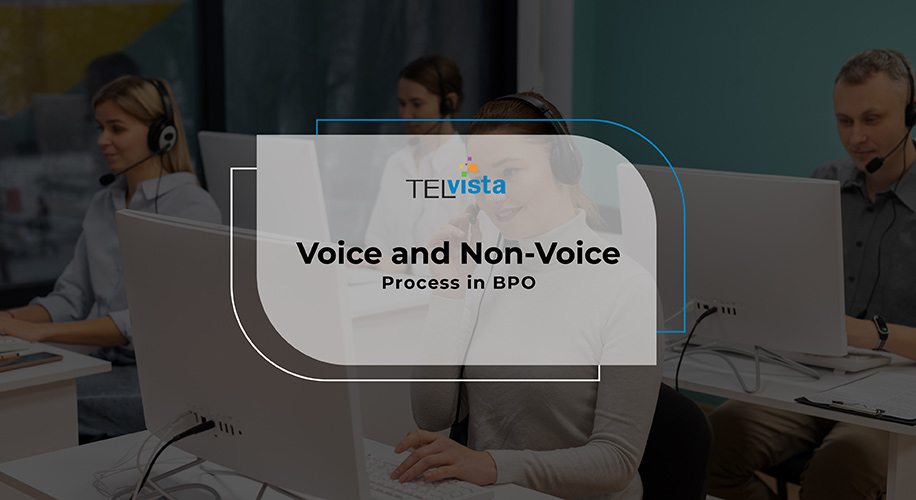BPO is a smart working strategy that companies utilize to scale their business, reduce operational costs, and streamline processes by outsourcing to a third party. By managing their burden, BPO services allow businesses to focus on their core functions.
Both voice and non-voice services have paramount importance in customer service. Voice services include interactions with both existing as well as potential customers over the phone. In contrast, non-voice processes include responding to customer queries via chat, SMS, or email. An omnichannel contact center leverages both mediums for customer engagement. In addition to sales and service, non-voice services may include HR, hiring, tech support, appointment scheduling, notifications, technical support, back office processing, and other tasks for the outsourcing client.
Voice Process
Phone interactions during any stage of the customer journey count as a voice process. Such interactions may be the first customer interaction, after-sales services, or troubleshooting and technical support. Effective communication skills and fluency in the customers’ language are crucial for agents to provide voice contact center services. As contact center services generally outsource to more cost-effective regions, having a workforce with language proficiency is essential. Language proficiency should include accent neutralization to ensure callers understand the agent, and has cultural familiarity, especially around your products and services. Outsource agents need to understand the customer experience.

Voice BPO processes can be divided into the following two categories:
Inbound Calls
Inbound calls are customer-initiated calls to a business. These calls could be the result of your marketing efforts for transactional purposes or from existing customers for support. An incoming call center may have both sales reps and service staff. Their job is to provide satisfactory answers to all types of customer queries as satisfaction is monumental in customer conversion and long-term retention.
To offer and maintain the quality of these calls, the following are important performance metrics:
- CSAT Score (customer satisfaction score)
- NPS (net promoter score)
- ASA (average speed to answer)
- FCR (first contact resolution)
- CES (customer effort score)
Outbound Calls
Outbound calls are the calls made to customers or prospects for the purposes of sales, marketing, sales offers to existing customers or they could be follow-up calls, notifications, or even surveys. An outbound contact center initiates an outbound calling campaign with one or multiple messages. Outbound calls that the customers or prospects are not expecting are “cold calls”. Cold calls can get much better contact rates by warming them with an email, SMS, or other message so that when called, the caller has a reference to who and why they are being called.
Besides the grasp of language, persuasiveness and other sales-oriented soft skills are necessary for agents for successful outbound campaigns. The performance measuring metrics vary based on the goal of the campaign. Common performance metrics include:
- Attempts
- Connects
- Completed Presentations
- Conversions (said yes to the message)
- Quality (followed all requirements)
Non-Voice Process
Responding to customer queries and customer engagement through chat, SMS, and email are considered non-voice processes. The non-voice mediums hold significant value with live chat being the preferred means of communication. In a recent survey, 41% of customers preferred customer support through live chat, and 23% preferred email support versus only 32% for phone. Interestingly, when it comes to billing concerns or questions, 68% of consumers prefer using SMS to contact their service provider as per GSMA stats. Customer support through other social media channels also falls under the same category.
Offering these services requires good written skills. Based on the products or services of a business, product knowledge and problem-solving skills may also be requisites for the agents. Further, for back-office work, specialized skill sets may be necessary instead of verbal or written communication.
The following are the types of non-voice BPO processes:
Chat Support
Live chat or chat support operates in a similar way to inbound calls. The incoming messages can be for new purchases or technical support for previous purchases. Customers ask their queries through either the live chat option or social media messages in the case of omnichannel contact center services. Customers often prefer this mode of communication for quicker responses. Contact centers often utilize AI technology like chatbots alongside humans for efficiency.
Knowledgeable staff who offer the best solutions/products play a significant role in enhancing customer experience. For this reason, performance KPIs on chat support and inbound calls are almost the same; CSAT, NPS, AWT, CES, and FCR are measured to track performance.
Email Support
Email support or ticket support is another major non-voice channel. Businesses utilize chat and email support options side-by-side to serve the preferences of more customers. Generating tickets bridges the gaps in communication and initiating troubleshooting or offering solutions to an issue, especially in the unavailability of live chat or call support during the off hours. That way they can cater to their customers and offer support 24/7.
Back Office Work
Back-office work covers a broad category of tasks that businesses outsource. A few common back-office tasks include managing accounts and databases, staffing, HR, and data entry.
Conclusion
Voice support and non-voice operations are crucial and should be any business’s key focuses for enhancing customer experience regardless of whether they are B2C or B2B business. Therefore, opting for outsourcing solutions of complete contact center services is more advantageous. Maintaining quality and monitoring performance metrics for all communication channels is essential for success and growth. Since BPO contact centers provide everything from infrastructure to workforce, training, and maintaining the quality of service, more companies are partnering with such call center service providers.




